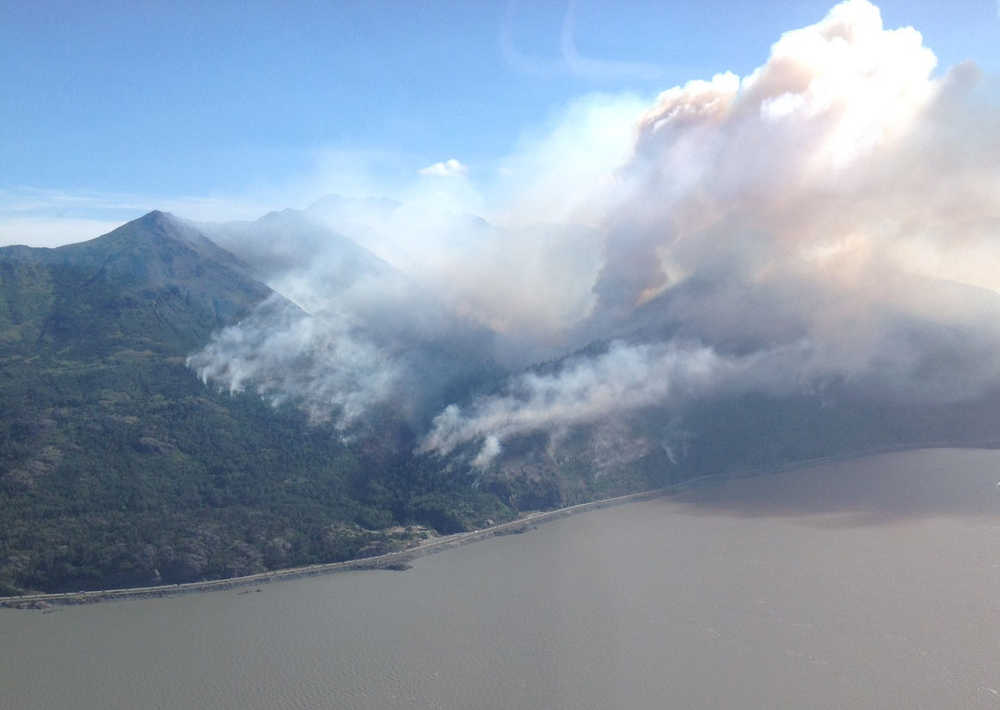Unusually warm temperatures, low humidity and dry brush and forest has put fire departments on edge across southcentral Alaska. The fire danger is high in Homer, and burn permits have been suspended.
A wildland fire burning through Chugach State Park near the McHugh Creek trailhead sent plumes of haze over Homer and the lower Kenai Peninsula this week. Kachemak Emergency Services also responded to its first wildland fire of the season on Monday when a small fire burned into duff near Mile 10 East End Road.
Southcentral Alaska could see some relief with a forecast of rain starting tonight. The forecast also calls for west to southwest winds that could push haze east and north. Visibility in Homer was 10 miles on Wednesday, a good sign air quality had improved, said Brehan Kohl, section manager for the Alaska Division of Air Quality.
The McHugh fire also burned close to the Seward Highway on Tuesday, prompting officials to close the northbound land of highway and shuttling vehicles through smoke with a pilot car between Miles 108 and 113. As of Wednesday morning, the highway had been reopened to two lanes.
“Motorists are urged to use caution in the area and expect delays if fire activity increases,” the Alaska Division of Forestry said in a press release.
Kachemak Emergency Services had a close call when a small fire burned into duff off Frontier Lane near Mile 10 East End Road. Although a 10-foot-by-10-foot fire, it had burned about a foot deep when firefighters responded about 3:30 p.m. July 18. KES and Division of Forestry firefighters put out the fire before it could flare up.
“We were lucky that somebody found it and there wasn’t a lot of wind,” said KES Chief Bob Cicciarella.
A construction worker called in the fire. Cicciarella said a road and house is under construction in the area, but he didn’t know the cause of the fire.
“It was definitely burning for a couple of days and went deep into the duff,” he said. “I burned my hand when I went to check for heat. It was like touching a hot pan.”
KES and Division of Forestry firefighters had to hike in through pushki and nettles to reach the fire. They used an ATV to bring in water to put out the fire.
The Division of Forestry also suspended burn permits for the Kenai Peninsula, prohibiting open burning of slash, burn barrels and lawns. Campfires and warming fires less than 3-feet wide and barbecue fires are allowed. People building campfires should have plenty of water on site to put out any embers that might escape the campfire enclosure. A cleared area of at least 5 feet also should be around the fire. That includes driftwood logs on beaches. State burning statutes require the fire to be completely out when you are done. For further information on the current burn suspension, call the Homer Volunteer Fire Department at 235-5155, the Division of Forestry at 907-260-4269 or visit www.forestry.alaska.gov/burn.
The Alaska Department of Environmental Conservation issued a general air quality health advisory for southcentral Alaska. The Municipality of Anchorage also issued a health advisory for the Anchorage bowl and Turnagain Arm communities due to smoke from the McHugh fire. Smoke may be unhealthy for children, the elderly and people with health conditions. Conditions are considered unhealthy for sensitive groups when visibility is 3-5 miles — about the distance from Homer to the south side of Kachemak Bay — and unhealthy for all groups when visibility is less that a mile.
The McHugh fire started at about 25 acres on Sunday. It prompted massive traffic jams from Girdwood to Potter Valley, with bumper-to-bumper traffic as people watched the initial response with helicopters hauling water buckets. On Wednesday, a Division of Forestry press release said the fire had grown to 350 to 600 acres. Much of the effort to fight the fire is from the air, include Alaska National Guard Blackhawk helicopters and other aircraft scooping water from Turnagain Arm. Hose lines were being set up Wednesday to protect the nearby Rainbow Valley subdivision. Firefighters also worked to assess the danger to the Potter Valley subdivision to the west and also to protect infrastructure along the Seward Highway, including powerlines and the Alaska Railroad.
Lower Kenai Peninsula travelers heading north should check road conditions at the state traveler information website at 511.alaska.gov.
Michael Armstrong can be reached at michael.armstrong@homernews.com.


